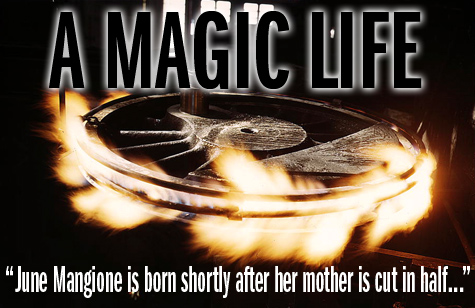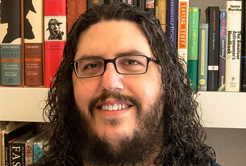 A Magic Life is a work in progress about a magician named June Mangione and her rise to fame through the 40s and 50s. From her birth and early years in a circus, to her final trick, June defies the odds and proves that no amount of hardship and loss can take away the magic of life.
A Magic Life is a work in progress about a magician named June Mangione and her rise to fame through the 40s and 50s. From her birth and early years in a circus, to her final trick, June defies the odds and proves that no amount of hardship and loss can take away the magic of life.
Update: Winter, 2019 – Currently seeking representation.
Listen to the first chapter. (Narrated by Cynthia Griffith.)
Read Chapter One:
Chapter 1
Breath of Life
June Mangione is born shortly after her mother is cut in half. Her first trick is an escape: slipping free from the soft grasp of her mother’s womb like handcuffs, untangling herself from umbilical chains—writhing and contorting as she makes her way through the birth canal as if shedding a strait jacket—she kicks and fights until being delivered nearly two months early into the hands of a waiting clown. Her arrival is a surprising appearance in a world where most things disappear.
“That’s not right,” the clown says.
June’s mother tries sitting up on the hay bales covered by two horse blankets emblazoned with BARNES BROS. CIRCUS serving as a delivery bed. “What’s wrong?”
“She ain’t much bigger than a yam, Ana.”
“She? Is she breathing?”
The clown puts his ear to June’s face. “Shit!” He rolls June over, cradling her in his large hands, the umbilical cord dangling between his fat fingers. He works his pinky into June’s mouth, checking for blockage.
June’s mother gets her first look. “She’s blue, Hank!”
“I’m trying!” Hank the clown rocks June back and forth in his hands, but she still isn’t breathing. “Where’s the damn doctor?!”
Moments before June’s arrival, her mother climbed into a cabinet and was sawed in half by her husband before a crowd gathered beneath a circus tent on a hot summer day. The initial tinges of birth came shortly before the show, small contractions that let Ana know the baby was coming sooner than planned. But it’s a performer’s job to go on no matter what. She had hid June well, able to wear costumes without the crowd noticing from a distance that she carried with her more than just a smile and moves to redirect their attention, but it was clear to those in the know that a backup assistant would soon be needed. Ana could only dance, gesture, and contort into illusion cabinets so long before the weight of her husband’s regret grew too big inside her belly to remain concealed.
The cramps came as June’s father slid two blades on either side of the cut he’d just made with a large saw. He separated each half of the box to show the audience that he had just cut his wife in half before their eyes. June’s mother felt the warm rush of amniotic fluid between her legs as the two pieces of the cabinet were rejoined and the blades removed. When the cabinet was opened, and Ana’s husband offered his hand to help her out, she sat up in the cabinet and waved to the audience, smiling through the pain. It was enough proof that she’d survived, and they burst into applause. Beneath the clapping, Ana said, “Joseph? The baby’s coming.” She was wheeled away and taken back stage.
“She’s bleeding!” one of the aerialists says while pointing to the mess spilling from between Ana’s legs.
“Ana, we need to take care of you,” Hank the clown says.
“No!”
“We need to cut the cord.”
“Not yet,” Ana says. She doesn’t care that she’s bleeding. “Let me hold her.”
“She’s still not breathing, Ana.”
“I know.”
“Ana, listen to Hank,” the aerialist says. “We need to stop the bleeding.”
“Give me my daughter.”
Hank the clown hands June to her mother. Ana lies back, cradling June to her chest. She coos in a reassuring tone as she gently pats and rubs June’s shoulders. “Come on, honey. Breathe.”
Nothing.
Ana’s trembling hands trace the contours of June’s back. “Breathe.”
Nothing.
“Ana?” Hank says. “Let us help you.”
“We need to help her,” Ana says.
Hank looks down; a tear falls onto one of his oversized, colorful shoes. “There’s nothing more we can do.”
Ana shakes her head and pulls June closer. She kisses the top of June’s head and whispers something to her; then she closes her eyes, exhales one final time in her life, and loosens her hold on her daughter. Moments later, June’s first breath—a cry that can be heard all the way out to the audience—lets the world know that a magic life has just begun.
* * *
Hank passes the bottle to June’s father, Joseph. Joseph stares at it for a moment and then takes a long pull, letting the whiskey burn its way down his throat and settle in his belly like a cigar ember. He stares off across the field where the Barnes Brothers Circus has set up for the next week, watching the evening settle in over the trees. Joseph holds the bottle by its neck and rocks it back and forth on his knee.
“What the hell am I going to do?” he says.
“You’re gonna get through this is what you’re gonna do,” says Hank.
“I suppose.” Joseph hands the bottle of whiskey back to Hank, who sets it aside. “What do I do with her is what I wonder?
“Do I let somebody else raise her? Do I bring her up here?” he says, gesturing toward the colorful big top that’s taken up residence in the greenest field he’s ever seen. “And what do we do with Ana?”
“You don’t need to know the answers to everything right now. Your daughter is in the safest place she can be, and we’re not moving on until she’s stable. Unless there’s someplace more special, this field seems like a good resting place for Ana’s ashes when you get them back. Right now you should just rest.”
“You know something, Hank? When you’re not wearing makeup, you’re quite a respectable looking guy.
“And when you’re not drunk and piling a ton of problems on your shoulders, you look like you can own the world.”
“That was the plan. Did I tell you Ana and I were about to get some parlor shows when we found out she was pregnant?”
“You’ve mentioned that about a dozen and a half times when you’ve been drinking, yes.”
Joseph points to the field before the tree line in the distance.
“What?” Hank says.
“There. It’s my favorite thing about summer.”
As if on cue, Joseph bobs his finger up and down, and a firefly dips and glows for a moment. Soon, others follow—Joseph raising and lowering his fingers like a conductor of light.
“When I was a kid, I used to think I made them appear.”
“Kids think funny things,” Hank says.
“Yes.” He continues pretending he’s directing the light show before them. Beneath the sound of a breeze rocking the distant trees, crickets join in: a natural symphony just for Joseph, his dead wife, and his new-born daughter in an incubator in the side show. Joseph stops moving his hands; he looks at Hank and says, “I wonder what kind of funny things she’ll think as she grows older?”
“There’s only one way to know for certain,” Hank says
. “We’ll do our best. I can think of plenty of worse places to be raised than the circus.”
* * *
June’s earliest memories come in flashes, storms etched forever in her mind by chemical lightning bolts that never stop burning where they strike. She lives in a world of sound and color, lulled to sleep by the growling of tigers and the trumpeting of elephants. In the morning, the squawks of large birds pull her from dreams of faraway places. By breakfast, the calls of roustabouts and singers practicing become background noise that would seem louder than thunder if everything suddenly stopped and gave way to silence. Wherever she turns, a kaleidoscope: the tent, blue and yellow, taking over a field of grass as though it were spilled from a bucket. The peeling paint from the train cars gathering on the ground like brittle flakes of colorful snow. Costumes sparkle, the world blurs before her—she will never know what it is to be bored.
It doesn’t stop with just sound and sight—all of June’s senses join in the dance. The stench of dung and damp straw bales is oddly soothing, something always there at the bottom of it all, reminding her she lives in a world of extremes. Not many children her age know the scent of grease paint and spirit gum. The feel of summer grass beneath her feet as dancers chase fireflies with her in the gloaming will never get old. In contrast, there is cold steel: tent poles, cages, and heavy tools. She’s long learned that the rough wooden sides of the train car she calls home leave behind splinters if she tries tracing the garish images painted on its outer walls. It’s a world as dangerous as it is magical. Finally, there are flavors: cotton candy melting on her tongue, stuffed cabbage and soups cooked by the Hungarians from the horse show, the ever-present taste of sawdust at the back of her throat.
If she lives to be 100, her mind crammed full of a lifetime of thoughts and memories waiting to be forgotten, these days will be the last to go.
